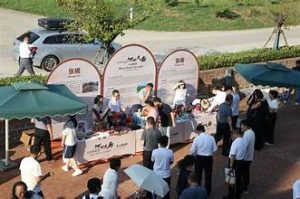Beyond landmarks, China’s grassroots events fuel new tourism booms

As China’s cultural and tourism market thrives, cities across the country are discovering new ways to engage travelers — not just through iconic landmarks, but by creating viral, experience-driven events.
Football fever boosting local tourism
This summer, a regional football tournament known as the “Su Chao” (short for Jiangsu Super League) turned into a surprise cultural phenomenon.
Organized by Jiangsu Province, the tournament features amateur teams from all 13 of its major cities, with players ranging from professional athletes to students and small business owners. With nearly 90,000 spectators attending matches in person since its May 10 kickoff, the event has sparked a surge in tourism-related consumption across host cities.
Host cities have capitalized on the momentum, offering fans ticket-linked discounts to local attractions, food festivals, and hotels. According to the data from the Jiangsu Smart Tourism Platform, the tournament helped boost out-of-town UnionPay tourism consumption by 14.63% in key host cities, setting a new model where sporting events drive tourism traffic and local spending in tandem.
Harbin, a winter wonderland with a warm heart
When it comes to winter travel, Harbin in northeast China is unmatched. Famous for its annual Ice and Snow Festival, the city draws millions of visitors with its dazzling ice sculptures, light installations, and winter outdoor activities.
In the winter of 2024, Harbin became a viral sensation across China, thanks to trending short videos and social media posts that showcased not just the city’s icy beauty, but also its warm hospitality.
Tourists across the country braving the cold, while scenes of steaming frozen pears, cheerful street performers, and glowing night displays spread rapidly online — turning Harbin from a popular destination into a nationwide cultural phenomenon.
Tianshui turning street food into a cultural catalyst
In early 2024, the small northwestern city of Tianshui, Gansu Province, suddenly found itself in the spotlight — thanks to a humble bowl of spicy hot pot. Tianshui’s version of spicy hot pot features hand-rolled noodles, fresh vegetables, and a rich, slow-simmered broth.
The local government quickly stepped in to welcome the influx of visitors. They launched shuttle buses and trained volunteers to assist tourists and introduced discounts at nearby scenic spots. According to the Tianshui’s Culture and Tourism Bureau, the city received over 31 million visitors in the first half of 2024, with tourism revenue reaching 17.76 billion yuan (approximately $2.45 billion) — up more than 40% year-on-year.
Zibo barbecue turned a food craze into tourism boom
In the spring of 2023, Zibo, an industrial city in Shandong Province, unexpectedly went viral thanks to its unique take on barbecue: bite-sized meat grilled over mini stoves, served with flatbread, scallions, and dipping sauce.
The city reacted swiftly to the sudden fame. It launched dedicated “barbecue trains,” expanded public transport services, enforced food safety standards, and opened late-night food markets. The city’s Culture and Tourism department curated ten themed travel routes that combine barbecue with sightseeing, turning “BBQ + tourism” into a new kind of visitor experience.





